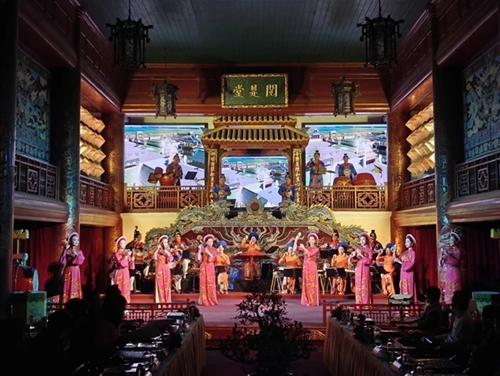The Hue Monuments Conservation Center, in collaboration with the Korean Institute of Architectural & Urban Research and SMC Hue Company, last week hosted a forum under the theme: "Strategic Directions for Heritage Economy, Green Economy, and Digital Economy Development in Thua Thien Hue Province.”
    |
 |
|
Hue Royal Court Music is a cultural heritage for developing tourism. |
The forum brought together experts, researchers, representatives of international organizations, and delegates from various domestic and international sectors.
Discussions centered on the green economy, heritage economy, and digital economy, offering strategic directions for sustainable development.
These strategies aim to promote digital transformation, build digital data infrastructure, and develop cultural industries while preserving and enhancing the cultural value of Hue’s heritage.
As a unique economic domain of Thua Thien Hue province, the heritage economy plays a pivotal role in the context of modernization and global integration.
Hoang Viet Trung, director of the Hue Monuments Conservation Center, emphasized that with eight UNESCO World Heritage titles, including six uniquely its own, Hue occupies a special position not only in Vietnam but across Southeast Asia.
Hue’s exceptional advantage lies in the diversity and interconnectedness of its heritage assets.
The complex of Hue monuments is more than an architectural marvel. It preserves court music, poetic inscriptions on architecture, embossed motifs on bronze urns, hydraulic systems, scenic landscapes, and greenery.
This interplay offers a comprehensive cultural experience that distinguishes it from standalone heritage sites in other regions.
"This opens up opportunities for multidimensional experiential tourism, combining sightseeing, art appreciation, and historical learning. Moreover, the coexistence of tangible and intangible heritage enables Hue to cultivate a unique cultural and creative industry," said Trung.
The planning of Hue’s heritage includes 30 identified values categorized into four types, including cultural, historical, and human values of Hue; architectural and artistic values; ecological, scenic, and positional values; and social values.
These values provide Hue with a foundation to leverage its heritage for green and digital economic benefits.
Green economic development
One notable example is the Heritage Medicine Space – Thai Y Vien (the Imperial Medical Institute).
Historically, it was where the Nguyen Dynasty's royal family received healthcare, and it holds a treasure trove of traditional remedies and royal medical knowledge.
According to Trung, the institute is not only a cultural symbol but also an economic resource for tourism and traditional medicine services.
"Visitors can engage in therapeutic programs such as acupressure, steam baths, and using traditional remedies. It could also evolve into a research and application center for traditional medicine integrated with modern medicine, generating revenue from health tourism while preserving and promoting traditional medicine professions," Trung said.
The waterways within the Citadel, connecting to the Ngu Ha and Dong Ba rivers, also represent a unique heritage asset with historical significance and vast economic potential.
These waterways could support activities like river tours, dining services, and historical reenactments using modern technologies to attract visitors.
Meanwhile, Thuong Thanh, part of the Hue Citadel, offers not only historical value but also potential for experiential tourism activities such as cycling, walking, and outdoor excursions.
Combined with its surrounding greenery, the area enables visitors to explore its historical functions and features, such as bastions and moats.
Festivals are also a highly effective way to promote Hue’s cultural heritage domestically and internationally. These events foster cultural exchange, stimulate tourism demand, and generate economic value through associated services.
Annual, four-season, and thematic festivals have created socioeconomic benefits for the province by attracting domestic and international tourists to participate in events.
They also provide opportunities for businesses and artisans to showcase their products and services, enhancing Hue’s reputation as a world-class cultural destination.
"We can see that developing the green and digital economies is not only an urgent requirement but also an opportunity for Hue to maximize its landscape and ecological values," Trung concluded.
Source: VNA